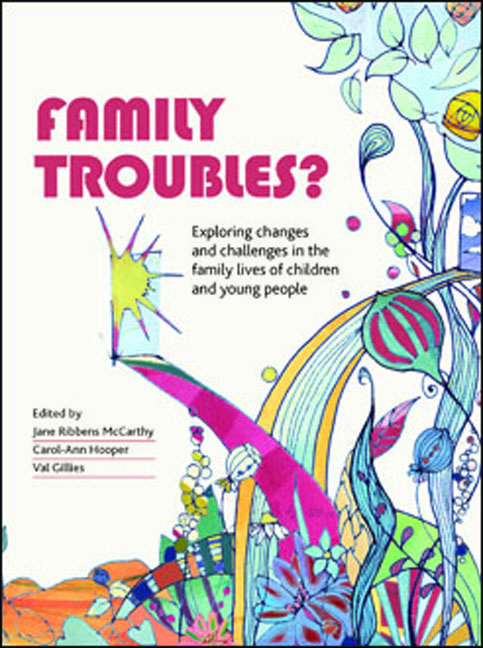Book contents
- Frontmatter
- Contents
- Notes on contributors
- Foreword
- Preface
- 1 Troubling normalities and normal family troubles: diversities, experiences and tensions
- Part One Approaching family troubles ? Contexts and methodologies :Introduction to Part One
- Part Two Whose trouble ? Conteste d definitions and practice: Introduction to Part Two
- Part Three The Normal, The Troubling And The Harmful?: Introduction to Part Three
- Part Four Troubles and transitions across space and culture: Introduction to Part Four
- Part Five Working With Families: Introduction to Part Five
- Index
4 - The role of science in understanding family troubles
Published online by Cambridge University Press: 07 September 2022
- Frontmatter
- Contents
- Notes on contributors
- Foreword
- Preface
- 1 Troubling normalities and normal family troubles: diversities, experiences and tensions
- Part One Approaching family troubles ? Contexts and methodologies :Introduction to Part One
- Part Two Whose trouble ? Conteste d definitions and practice: Introduction to Part Two
- Part Three The Normal, The Troubling And The Harmful?: Introduction to Part Three
- Part Four Troubles and transitions across space and culture: Introduction to Part Four
- Part Five Working With Families: Introduction to Part Five
- Index
Summary
The need to give science a central role in understanding family troubles arises from three different, but somewhat related, considerations. First, both the media and political statements, as well as all too many supposedly scientific papers, make all manner of claims about the family that are based on anecdotal reports by unrepresentative samples of volunteers, together with the use of weak, and often biased, measures. It is, therefore, crucial to check these claims through the appropriate application of high-quality science (British Academy Working Group Report, 2010). Second, even when evidence of associations is based on proper sampling and appropriate measurement, there is all too often a sliding from the demonstration of an association to an assumption that it must reflect a causal effect. There is an abundance of evidence that that is not justified but, equally, that there are good scientific approaches that can do much to test the causal inference (Academy of Medical Sciences, 2007; Rutter, 2007; Jaffee et al, 2012). Third, when moving from evidence, of whatever kind, to policy implications, there is a tendency for people to assume that because they are in some way part of a family, they are thereby an expert on families. Accordingly, it is essential to examine carefully the paths leading from evidence, through causal inference to policy implications (British Academy Working Group Report, 2010).
What constitutes good science?
Before turning to the different questions on which science may have something to offer, it is necessary to begin by considering what constitutes good science. How do we differentiate between good and poor science? In 1973, Merton (1973) proposed that there were three main features that characterised goodquality science. First, the research must involve a search for principles that can be generalised beyond the sample studied. Second, the approach should involve organisation – meaning conceptualising the meaning or the mechanism underlying any set of findings or observations. Third, there must be an attitude of scepticism; that is, there must be a norm of questioning, challenging and always looking for alternative counter-explanations to the proposition being put forward.
Nearly three decades later, the US National Research Council (2002), when considering scientific research in education, put forward six criteria.
- Type
- Chapter
- Information
- Family Troubles?Exploring Changes and Challenges in the Family Lives of Children and Young People, pp. 45 - 58Publisher: Bristol University PressPrint publication year: 2013

